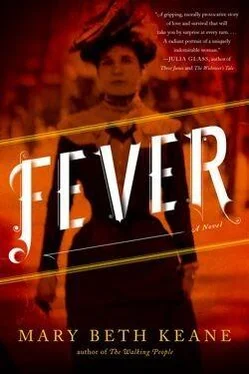“Seems like a good sign,” the man said, and wrote down her address. He printed her name on top. “You said Browne, yes?” he tilted the paper to show her.
“No e at the end,” she said. “Brown.”
He struck a line through the e . “Good,” he said, and shook her hand. She expected him to say that she’d hear from him once he checked out her references, but since Mrs. Waverly had recommended her, he told her she could start the following week unless she heard from them to do otherwise. On her way out she passed a room where six women in six beds were recuperating, their babies next to them in bassinets.
Once Mary got used to being addressed as Mrs. Brown, she decided that the hospital was, without question, the best situation she’d ever had. She’d seen childbirth before — she was charged with holding a leg when a neighbor of Aunt Kate’s went into unexpected labor, and many times she’d waited downstairs with other staff while the mistress of a house moaned and roared until the doctor arrived with chloroform. She expected Sloane to be a chaotic place, and that she would have to weave through a dozen exhausted women as they walked the halls just as laboring women used to walk the halls of the tenements, trying to help the baby come, their fingertips brushing the wallpaper for balance. Instead, Sloane was organized. It was a clean, bright, shining place with strange contraptions in every room to help the doctors know more about the baby that was to come. The nurses made reference to Twilight Sleep and it took Mary a week to realize that they were referring to labor, which was mostly silent, and often the babies were born silent, too, which struck Mary as worrisome but didn’t seem to faze the nurses, who swaddled their limp bodies into tight little packages and propped them up on pillows for their mothers to admire. Only later, hours, sometimes days later, would the babies come out of it, and begin to whimper and cry. Those babies who were particularly cranky got a soothing syrup of codeine to quiet them.
The doctors didn’t care what she did as long as there were hot meals coming out of her kitchen. Unlike in a private home where the staff wasn’t permitted to have an opinion about anything political, at Sloane they passed the time talking about President Wilson, the income tax, the war brewing in Europe. The administrator occasionally checked in with her, but only to ask if she had what she needed in the way of equipment and help. The staff was honest, and when she sent them out to shop they came back with what she asked for — what did she care if they snuck a few things home to their own pantries? She’d done it often enough herself.
She arrived at the hospital at five in the morning, and left at five in the evening, once she was sure the staff knew how to complete the supper she’d started, and that there would be enough to go around. Always, as her final chore, she left the oats soaking in water so they’d cook up quickly in the morning.
Then, one evening, about six weeks after she started at Sloane, and with two sliced-turkey sandwiches wrapped carefully in her handbag, Mary arrived at their rooms to find Alfred on the floor next to her side of the bed, his face gray and his skin like a cold piece of cod. She shouted his name sharply as she took his hands and tried to pull him up. She dropped his hands and slapped his face. “Alfred!” she said again. She slapped him again. And then, just as she was about to run out into the hall for help, he blinked, and tried to sit up. “Get Jimmy,” he told her. “Or Mr. Hallenan. Someone strong.”
“What are you talking about?” she demanded. “We’re not on Thirty-Third Street anymore. Come on, Alfred. Stop it.”
He was quiet for a long time, and she thought he might have fallen asleep with his eyes open.
“I’m okay now, Mary. I just got confused.”
Mary let out a long sigh of relief. “You scared me.”
The next day, she didn’t want to leave him for twelve hours, and thought to ask someone from the building to look in on him while she was at work, but as she walked down the stairs she realized that although she knew her neighbors well enough to exchange pleasantries, and had done laundry or cooked a dish for many of them, she didn’t know any of them well enough to ask for a favor like that, not when they’d have a thousand questions about it, and maybe tell everyone else. No, better to leave him sleeping. There were times when he slept all day long, and she predicted this would be one of those days. He’d stay curled under the covers until she came home again, and then, if she had luck, she’d get him to eat something. She’d left bread and butter on a plate beside the bed, and next to it, a tall glass of water.
She was distracted all day at the hospital. A new mother had died in the middle of the night. Sepsis, they determined, and the mood everywhere, including the kitchen, was somber. The nurses cried over the little baby girl left behind, and cried harder when the husband came and didn’t seem to know how to hold her. They took Mary’s silence as part of that sadness, and she was glad to not have any questions. It was terrible about the mother, terrible when any young person dies, but she couldn’t stop herself from thinking that they were rich, these women. The price of giving birth at Sloane was more than Mary would earn in six months, and if they had that kind of money then they also had a full staff, families to help. There were poor women all over the city dying every minute of the day, leaving two, three, four babies behind.
She wondered if Alfred had woken. She wondered if he’d seen the bread. Sometimes he felt a world better after he washed himself, and she meant to leave a bar of soap and a washcloth on the ledge to remind him. She could pretend a headache, leave early, go home to check on him. A walk would do him good, if he could manage it. Maybe they’d go out to eat that night. There was a new restaurant by the university and it might do him good to be in a busy place. The energy of the city would sweep him past the day’s trouble.
She diced and sautéed and lifted the wooden spoon to her mouth for a lick, returned it to the pan, turned the food ’round and ’round. She shook salt, pepper, chopped fresh oregano, parsley, swept it from the blade of her knife with her finger, all while thinking about Alfred. She measured cream, checked for spots on glasses, bowls, forks, spoons. She asked one of the new girls to wash everything again.
When she got home, Alfred was better but didn’t want to go anywhere, and so Mary sat in the dim kitchen by herself, her feet up on Alfred’s chair. She felt tired, and realized only when she sat down how worried she’d been. She tried to read but she caught herself going over the same sentence again and again.
The next morning, the nurses were sharp with one another. Two were out sick, one of them Mrs. Waverly, and without her calm authority the rest of them were like children left behind in a room without an adult. Mary thought of Alfred, hoped he hadn’t caught anything. Perhaps whatever was bothering him now had nothing to do with the medicine at all. Maybe he had the flu. Maybe he’d be up and better in a day or two.
That evening, he was bad again, and she could see he’d been up and around while she was at the hospital. The cutlery drawer was left hanging open. There was a glass in the sink. He was fully dressed but sleeping on their bed, and she had to say his name three times, and shake him, before he cracked his eyes to look at her. “Mary,” he said, and put his hand on her lap before falling asleep again.
More were absent the next day at the hospital, and a mother who’d been released a month before was readmitted, with her child, both of them slack with fever. More sepsis, the kitchen assistant guessed. The administrator put the sick woman in a room to herself, and then came down the hall to ask Mary if she’d mind pitching in if she had a moment. There was so much to do, and it would only be for a few days, until everyone recovered from whatever was going around and they were back to full staff again. The doctors rushed through the hallways looking stern, tired, worried. The ones who normally left when Mary did now stayed on, some stayed all night. As she was rolling supper down the hall on the dining cart, she observed three of them talking in hushed tones in a quiet corner of the passageway. One took off his glasses to rub his eyes.
Читать дальше












